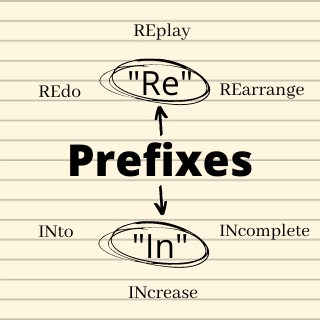
This language lesson is designed for 6 to 12-year-old children to help them understand how the meaning of the word changes when the prefix ‘Re’ or ‘In’ is applied.
In the previous video lesson, we learned about the prefix meaning and the application of the prefix ‘im’. In this video, we will learn about prefix re- and prefix in-.
One of the most difficult aspects of English grammar is learning prefixes. These are small grammatical changes to the complete meaning of the word. Learning the meanings of prefixes helps children to expand their vocabulary, which further will help improve their writing.
Prefix ‘Re’
Prefix ‘Re’ is one of the most common prefixes used in the English language. The prefix ‘re’ means again, back, or to repeat. Any verb or adverb preceded by ‘Re-‘ indicates that it is being performed or described again.
Some Common Examples of the Prefix ‘Re’
- word: words with the prefix ‘re’
- Fill: Refill
- Appear: Reappear
- Use: Reuse
- View: Review
- Cycle: Recycle
- Ply: Reply
- Turn: Return
- Play: Replay
- Live: Relive
- Do: Redo
- Build: Rebuild
- Heat: Reheat
- Write: Rewrite
- New: Renew
- Tire: Retire
Fun Fact
In some cases, when the prefix ‘Re’ adds a ‘d’ to make a word easier to pronounce; this occurs before some vowels (e and u). For example, redeem, redundant, etc.
Exceptions
Some words that begin with ‘Re’ doesn’t mean that they begin with the prefix ‘re-‘ for example, reluctant, respect, reach, read, rest, revelry, etc.
Rules for using ‘Re’ prefix
- Does the word is a verb or an adverb?
- Does the word mean to do something again, back, or repeat?
Prefix In
The prefix in, is used before root words where it means “in, no, or not,” for example: inject, influx, and insane.
The meaning of the prefix can’t be directly determined unless one knows the word and the meaning of the new word makes more sense. Sometimes try applying a trial-and-error method to find the meaning that works for a particular word.
Some Common Examples of the Prefix ‘In’
- word: words with the prefix ‘In’
- Equality: Inequality
- Sane: Insane
- Human: Inhuman
- Famous: Infamous
- Formal: Informal
- Valid: Invalid
- Explicit: Inexplicit
- Tangible: Intangible
- Effective: Ineffective
- Decisive: Indecisive
- Direct: Indirect
- Decency: Indecency
Watch the video to learn how to use the prefix ‘re’ and the prefix ‘in’ before words and how it changes the meaning of the word.
Encourage the child to practice this concept with different English words and help them add new words to their vocabulary.
Related Videos
For more language resources, click here.
Video Created by: Justine McNeilly
Tags
- elementary level
- English
- english language
- Language
- language development
- prefixes





